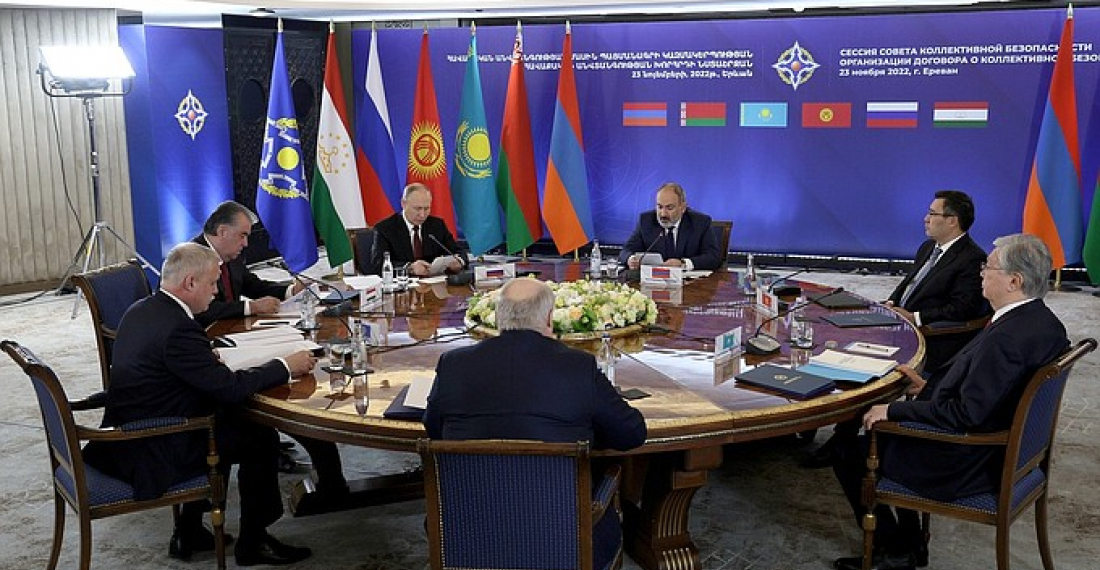President Vladimir Putin of Russia travelled to the Armenian capital Yerevan on Wednesday for a meeting of the heads of state and government of the Collective Security Treaty Organisation (CSTO). At Yerevan airport Putin was welcomed by Armenian prime minister Nikol Pashinyan, with who he held discussions soon after on the situation around Nagorno-Karabakh.
Apart from Putin and Pashinyan also attending the summit are the leaders of the other four CSTO members, Belarus, Kazakhstan, the Kyrgyz Republic and Tajikistan. Relations between Armenia and Azerbaijan, the situation in Afghanistan and Ukraine dominated the talks.
A report on the Kremlin website said that a number of documents were agreed. At the end of the meeting the chairmanship of the CSTO for the next year passed on from Armenia to Belarus.
Speaking at the meeting President Putin said Russia supports the decisions taken on the improvement of the CSTO communication system, the creation of a joint formation of radiation, chemical, biological protection and medical support, and the functioning of a unified system of technical cover for railways in the CSTO.
"And, of course, we are all truly united by the work of preserving the memory of the common history of our states, that our peoples together won the Great Patriotic War. We are constantly working on this together, and, in my opinion, we are paying the necessary and necessary attention to these issues", President Putin added.
Of course, we see not only achievements, but also problems. Colleagues talked about this today, today we will talk, I think without any cameras, about this in more detail. But still, it is obvious to us that joint work within the CSTO brings visible practical results, helps to protect the national interests, sovereignty and independence of our countries.
The Russian president then spoke about Armenia-Azerbaijan relations:
"Our further attention, of course, is required - I agree with colleagues who have already spoken about this - and issues related to efforts to achieve a comprehensive Armenian-Azerbaijani settlement. Of course, this is a sensitive issue that requires our attention.
In this regard we positively assess the summit of the leaders of Azerbaijan and Armenia held in Sochi at the end of October in the presence of your obedient servant, the President of Russia. The talks that took place created a good basis for future compromises on fundamental issues. It is important that the joint statement reaffirmed the commitment to the tripartite agreements at the highest level that were reached earlier - in 2020 and 2021, and the key role of our joint format of interaction in ensuring peace and stability in the South Caucasus.
Only by consistently fulfilling these agreements on the issues of delimiting the border, unblocking transport communications, and solving humanitarian problems, it is possible to achieve a stable normalization of relations between Armenia and Azerbaijan. We hope that this will eventually lead to the conclusion of a peace treaty between Yerevan and Baku. We have already briefly exchanged these considerations with the [Armenian] Prime Minister, during our bilateral meeting today, of course, we will talk about this in more detail."
Before flying to Yerevan, Putin had a telephone conversation with Azerbaijani president Ilham Aliyev.
In Yerevan the Russian leader also made a reference to the situation in Afghanistan, adding:
"I share the concerns of my colleagues who spoke about the situation in Afghanistan: it certainly remains difficult. The danger of penetration of militants of various international terrorist organizations into the territory of the CSTO states is still great, and the spread of extremist ideology among the population of Central Asian countries increases the risk of activation of the radical underground in the region. This applies, in fact, to all our countries.
We consider further close coordination within the framework of the CSTO on all key aspects of the Afghan problem highly demanded. It is necessary to continue close work through the competent services in order to timely identify the threats of terrorism, extremism and drug crime. And, of course, to neutralize these threats with the help of joint special operations and operational measures that have proven their effectiveness.
We will promote stabilization in Afghanistan and within the framework of other multilateral mechanisms. Last week, I want to inform you about this, a meeting of the Moscow format of consultations was held in the Russian capital: Russia - China - Pakistan - Iran - India and five Central Asian countries. The priority task at this stage is to ensure the formation of a truly inclusive Afghan government, which will include representatives of all ethnic groups at the required level."
Putin left Ukraine for the private conversations with his CSTO colleagues, some of who are greatly concerned at Russia's continued aggression against Ukraine, which in the last days has taken the form of targeted attacks at vital infrastructure, including the energy sector.
source: commonspace.eu with kremlin.ru and agencies
photo: Leaders of the six CSTO member states met in Yerevan on 23 November 2022.






